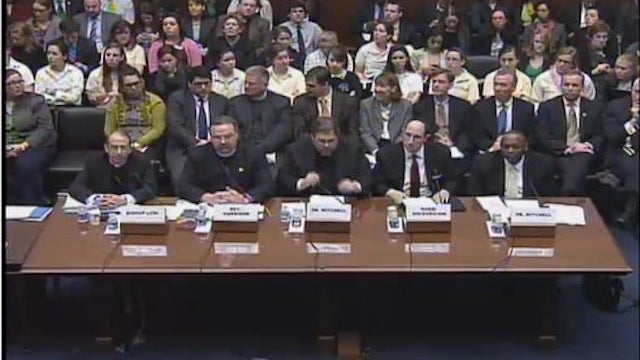As the Democratic Party’s presidential primary between Hillary Clinton and Bernie Sanders heats up, I’ve noticed an increasing tendency among some to argue that Clinton’s gender should be irrelevant to the decisions people make at the polls—or even that any consideration of Clinton’s gender at all is anti-feminist. I couldn’t disagree with this assessment more strongly.
Let me be clear: I am not telling you that you should vote for Clinton. I am not even telling you that I am voting for Clinton. I am simply getting tired of people saying that Clinton’s gender shouldn’t matter, because it does.
We often mention the fact that only 19.4% of members of Congress are women as evidence that we still have a long ways to go to achieve full gender equality. We do this not only because barriers to women’s electability reflect larger barriers to women’s equality but also because representation matters. It matters who represents us and who makes policy. As an example, do we all remember this moment?

Back in 2012, the House Committee on Oversight and Government Reform put together a panel to discuss the birth control mandate, which requires insurance companies to cover birth control. When images of this panel revealed that it included not a single woman, people were enraged. Why? Because representation matters. Because a woman’s perspective on an issue will be different from a man’s perspective even if they share the same principles. Why? Because our actions and our positions are informed by our different experiences—and that matters.
This is why Obama could respond to the shooting of Trayvon Martin like this:
“If I had a son, he’d look like Trayvon. When I think about this boy, I think about my own kids.”
A white president could have expressed outrage, but it wouldn’t have been the same.
Now let me explain what this does not mean. It does not mean that if you are a woman you should always vote for the woman, or that a woman will always best represent your interests. By no means. Representation matters, but issues matter too—a lot. Michelle Bachman and Sarah Palin offer a case in point. They are both women, but I would never vote for either of them because they hold very different positions on most issues. In a very important sense, issues matter more than representation.

But let me ask you this—if the birth control panel above had been comprised of six progressive men, would we still have been upset? Yes. Why? Because issues are not the only thing that matters. Representation matters too. This is why I’m bothered when I hear people say Clinton’s gender shouldn’t play any role in voters’ decisions. It should. It shouldn’t be the only factor considered by any means, or the most important factor, but it should be a factor, and it’s not anti-feminist to say that.
There’s a second way representation matters, too.

Do you see that little boy? He wanted to touch President Obama’s head to see if the president’s hair felt the same way his hair does. When children see someone who looks like them in positions of power and influence, it sends them messages about what they can achieve. White boys grow up with a panoply of white male presidents reminding them that white males can succeed. Obama’s presidency mattered because it showed millions of black kids that there are chinks in this longstanding white male dominance. A Clinton presidency would show girls the same thing.
Consider that my six-year-old daughter, Sally, has never known a white presidency. She has spent her entire life under a black president. It’s what she knows, and what seems normal to her. The same is true for millions of kids across the country, and that matters. Consider, for a moment, that a Clinton presidency could mean my daughter would be halfway through high school before experiencing a white male presidency. After 43 white male presidents in a row, that would be nothing short of incredible.
We know that representation shapes children’s perceptions of what they achieve. It’s the reason we work to present girls with role models in business and in STEM fields. It’s the reason we ask for movies with female leads. Having a female president would shape girls’ perceptions of what they can be, and how high they can reach. It would tell them that even the highest echelons of power are open to them, if they are willing to reach. It wouldn’t make getting there easy, by any means, but it would put it within the realm of what they consider possible.
All else being equal, I will vote for the female candidate over the male candidate, because gender matters. Representation is not irrelevant, it’s critically important. In fact, all else being slightly unequal, I would probably still vote for the female candidate because gender is a factor I would weigh when making my decision. That means, yes, that I would vote for a slightly less qualified female candidate over a slightly more qualified male candidate, and potentially even for a female candidate I disagree with slightly over a male candidate I agree with entirely.
I’ve heard people claim that it’s racist or sexist to factor in a candidate’s race or gender when making decisions about who to vote for—i.e., that voting for a candidate because they are black or a woman is just as racist or sexist as voting against a candidate because they are black or a woman. Such arguments ignore the importance of what I’ve discussed above—that representation matters. Voting for a candidate solely because they are black or a woman (or both) would be a problem, of course, because it would seem to assume that these groups hold monolithic views when we know they don’t. Remember, issues do matter! But there is nothing wrong with factoring representation into our electoral decisions—indeed, I would argue that it’s something we should be doing.
This is not to say that you should vote for Clinton, or even that I will. I’ve heard from friends all over the map on this issue, and if my readers are at all similar to my friend base I know that many of you see Clinton as a corporate sellout and feel that the straight-talk Sanders offers outweighs the gains in representation we would gain under a Clinton presidency. That’s fine. It is not anti-feminist to vote for Sanders. Others among you may see the balances tipping in Clinton’s direction. That’s fine too.
My goal here is not to throw the oar in on one side or the other, but simply to note that Clinton’s gender is not irrelevant. It matters, and is a factor that should be included in voters’ decision-making. And you know what? It’s not anti-feminist to say that.















